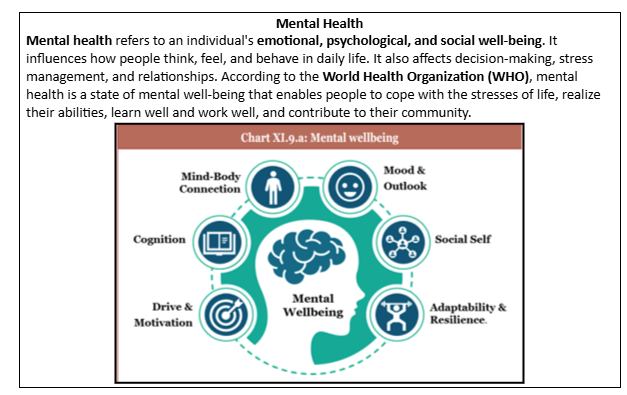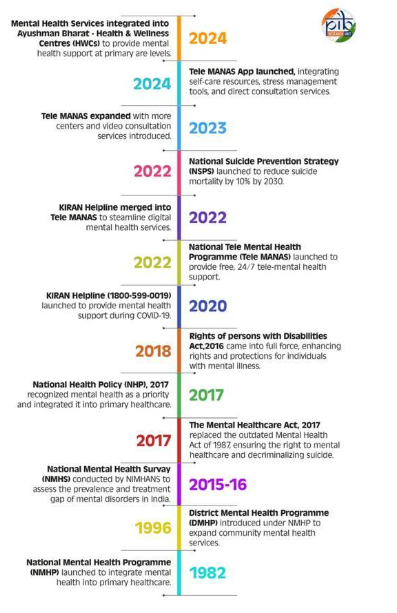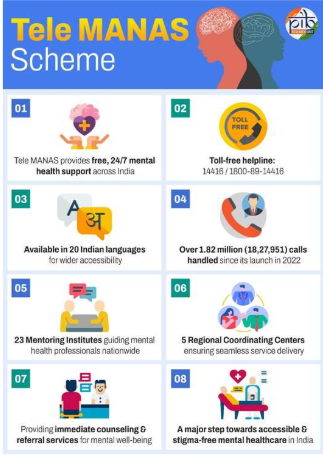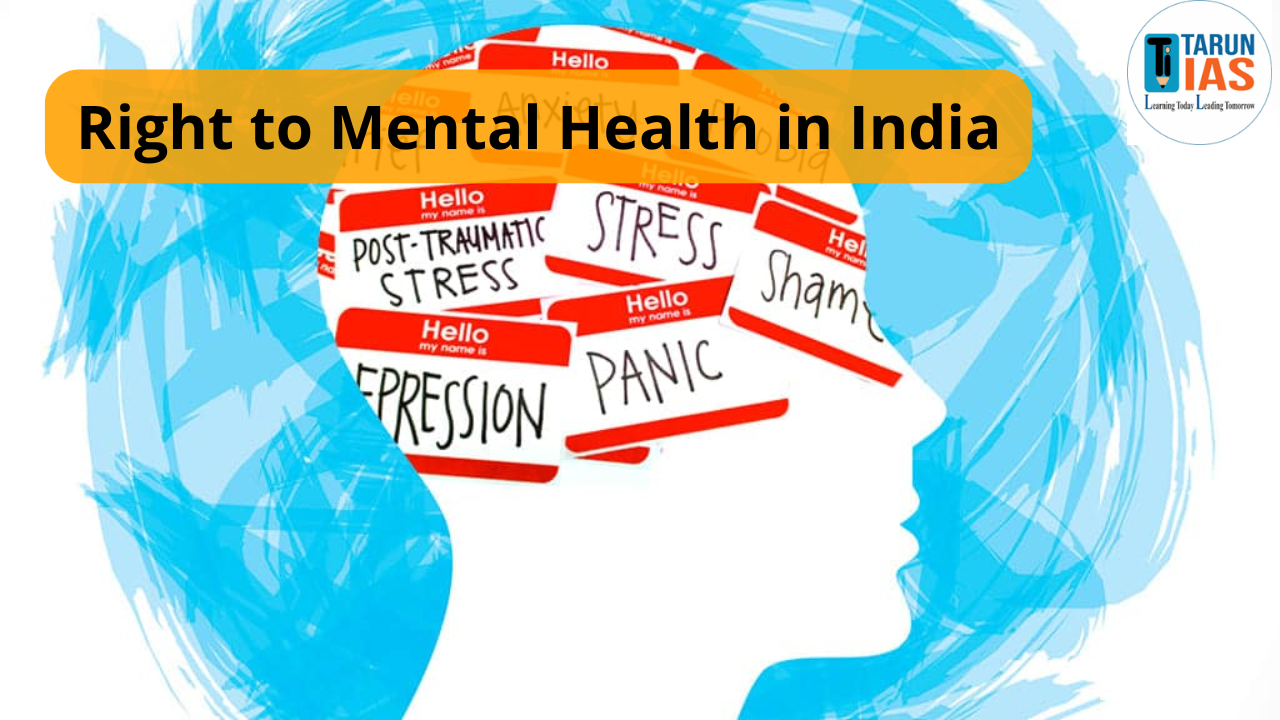Right to Mental Health in India Introduction
- The Supreme Court of India in the Sukdeb Saha v. Union of India case delivered a historic ruling that elevated mental health to the status of a fundamental right under Article 21 of the Indian Constitution.
- This pathbreaking judgment has far-reaching implications for mental health governance, especially in educational institutions.

| Mental Health
Mental health refers to an individual’s emotional, psychological, and social well-being. It influences how people think, feel, and behave in daily life. It also affects decision-making, stress management, and relationships. According to the World Health Organization (WHO), mental health is a state of mental well-being that enables people to cope with the stresses of life, realize their abilities, learn well and work well, and contribute to their community. |
What did Supreme Court Rule?
- Mental Health Recognised as a Fundamental Right:
-
-
- The Court affirmed that mental health is an integral part of the right to life under Article 21, not merely a statutory or policy matter.
- This recognition gives mental well-being constitutional status, putting it on par with other basic human rights.
-
- Constitutional Protection Beyond Statutory Entitlements:
-
-
- Citizens can now demand psychological well-being safeguards as a constitutional right, rather than depend solely on legislative entitlements under existing laws.
- This strengthens legal remedies available to individuals facing mental health neglect or discrimination.
-
- Bridging Gaps in the Mental Healthcare Act, 2017:
-
-
- The judgment addresses long-standing implementation gaps in the Act by providing a constitutional foundation for its enforcement.
- It ensures that legal obligations on mental healthcare are not just statutory but also constitutionally enforceable.
-
- Establishing a Normative Benchmark for Institutions:
-
-
- The Court set a higher standard of responsibility, requiring state institutions and educational establishments to actively protect mental health, not merely acknowledge it.
- This shifts the role of institutions from passive observers to active guardians of psychological well-being.
-
- Transforming Students into Rights Holders:
-
-
- The judgment redefines students as active rights holders, entitled to constitutional protection of their psychological integrity.
- It reinforces that educational spaces must ensure mental safety and emotional well-being as part of the right to life.
-
- Creating a Judicial Precedent for Future Cases:
-
- This decision establishes a binding legal framework for all future courts, which must now consider mental health as a fundamental right while adjudicating relevant matters.
- It sets a strong judicial precedent for mental health jurisprudence in India.
Mental Health Scenario in India
- WHO Data Insight:
-
-
- India accounts for 18% of the global population.
- According to WHO, the burden of mental health conditions in India is 2443 disability-adjusted life years (DALYs) per 10,000 population.
- The age-adjusted suicide rate is 21.1 per 100,000 population.
- Between 2012 and 2030, the economic loss attributed to mental health disorders is projected at USD 1.03 trillion.
-
- Prevalence:
-
-
- The National Mental Health Survey (NMHS) 2015–16 conducted by NIMHANS reported that 10.6% of adults in India suffer from mental disorders.
- The lifetime prevalence of mental disorders in India is 13.7%.
- National-level studies highlight that 15% of the adult population requires intervention for mental health issues.
- Mental disorders are more prevalent in urban areas (13.5%) compared to rural regions (6.9%).
-
- Treatment Gap:
-
-
- An estimated 70% to 92% of individuals with mental health conditions do not receive adequate treatment due to stigma, lack of awareness, and shortage of professionals.
- India has only 0.75 psychiatrists per 100,000 people, whereas the WHO benchmark is at least 3 per 100,000.
-
- Insights from Economic Survey 2024–25:
-
- Mental wellbeing is defined as the ability to cope with life’s challenges and function productively.
- The Survey underscored that mental health encompasses emotional, social, cognitive, and physical capacities, making it integral to overall wellbeing.
- It advocated a community-wide approach and called for preventive and impactful interventions.
- The Survey emphasised that India’s demographic dividend is closely tied to the mental health, education, skills, and physical wellbeing of its youth.
Challenges in Implementing Constitutional Protection for Student Mental Health
- Persistent Implementation Gaps:
-
-
- Judicial directives alone cannot dismantle entrenched cultural norms and institutional behaviours.
- Without consistent efforts, collaboration, and accountability mechanisms, there is a risk that the constitutional mandate remains symbolic rather than operational.
-
- Resource and Infrastructure Constraints:
-
-
- Schools, colleges, and state governments require significant financial and human resource investments to build effective mental health support systems.
- There is a shortage of trained mental health professionals, counsellors, and accessible psychological services, especially in rural and semi-urban regions.
-
- Deep-Rooted Cultural Resistance:
-
-
- The traditional education ecosystem in India often glorifies competition, academic performance, and rank-based hierarchies, which clash with efforts to normalise mental health support.
- Societal stigma associating mental health issues with weakness can further hinder open dialogue and institutional acceptance.
-
- Need for Comprehensive Capacity Building:
-
-
- Educational institutions must undergo large-scale capacity building and training to transition from purely academic spaces to holistic student well-being ecosystems.
- This requires curriculum integration, teacher training, peer support structures, and leadership sensitisation to address mental health proactively.
-
- Ensuring Monitoring and Real Impact:
-
- There is a risk that compliance with the Saha Guidelines may become a box-ticking exercise, focusing on documentation rather than genuine outcomes.
- Effective implementation demands robust monitoring frameworks, periodic audits, and outcome-based evaluations to ensure that the constitutional protection translates into real psychological safety for students.
Government Initiatives on Mental Health
- National Mental Health Programme (NMHP), 1982: Integrated mental health into general healthcare. Expanded District Mental Health Programme to 767 districts.
- NIMHANS Act, 2012: Declared NIMHANS as an Institute of National Importance with advanced roles in research and psychiatry training.
- Rights of Persons with Disabilities (RPwD) Act, 2016: Expanded disability definition to include mental illness, aligned with UNCRPD.
- Mental Healthcare Act, 2017: Guaranteed the right to affordable mental healthcare, decriminalised suicide, and safeguarded dignity.

- National Health Policy, 2017: Recognised mental health as a priority and stressed integration with primary healthcare.
- iGOT-Diksha Platform, 2020: Provided digital training to doctors, nurses, and community workers for diagnosis, treatment, and awareness.
- National Mental Health Programme (2024): Established 25 Centres of Excellence and 47 PG departments in government medical colleges. Introduced mental health services in 22 AIIMS.
- Ayushman Bharat: Through 1.73 lakh Health and Wellness Centres, provides counselling, psychiatric medication, and referrals.
- Tele-MANAS (2022): Offers a free, 24×7 helpline in 20 Indian languages, managing 2.5 million calls by August 2025.

Way Forward
- Increase Funding:
-
-
- Allocate significantly more than the current 1% of the health budget to mental health.
- Ensure affordable and accessible services for vulnerable groups and informal sector workers.
-
- Build Human Resource Capacity:
-
-
- Train primary care doctors, nurses, and health workers in mental health identification and care.
- Increase the number of psychiatrists, psychologists, and social workers with incentives and scholarships.
-
- Expand Accessibility:
-
-
- Establish community health centres, emergency care units, and mobile outreach services.
- Strengthen social protection schemes like MGNREGS to reduce economic stressors impacting mental well-being.
- Expand helplines such as Kiran and Tele-MANAS, particularly in schools, colleges, and workplaces.
-
- Strengthen Policy Implementation:
-
-
- Ensure robust execution of the National Mental Health Policy (2014) and Mental Healthcare Act (2017).
- Develop reliable data systems to monitor prevalence, treatment gaps, and effectiveness.
-
- Learn from HIV-AIDS Model:
-
-
- Adopt evidence-based strategies, community involvement, and centralised coordination through an independent mental health authority.
-
- Awareness and Destigmatisation:
-
-
- Run nationwide campaigns in schools and communities to normalise help-seeking behaviour.
- Empower families, peer groups, and caregivers to support those in distress.
-
- Partnerships and Collaboration:
-
-
- Expand partnerships with NGOs and civil society groups to deliver services in underserved regions.
- Successful models include organisations like Banyan (Tamil Nadu), Sangath (Goa), and Centre for Mental Health Law and Policy (Pune).
-
- Economic Survey 2024–25 Recommendations:
-
- Introduce mental health education in schools with early intervention.
- Enforce workplace policies to address stress and burnout.
- Strengthen Tele-MANAS and explore AI-based mental health services.















